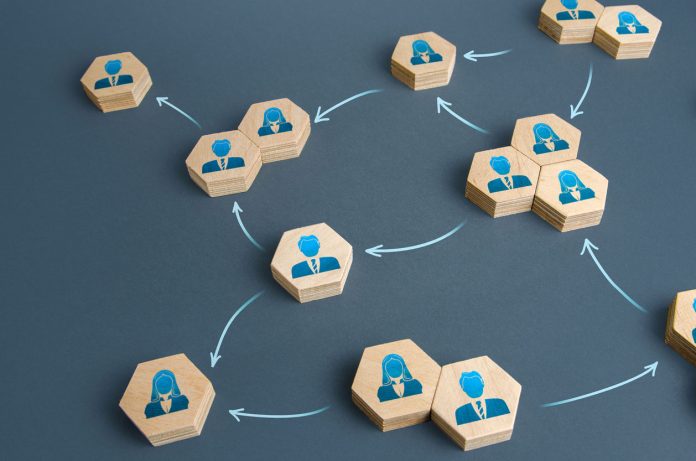By Akanksha Malik
DAO, Decentralized Autonomous Organization, is a legal structure where there is no central governance. Every shareholder shares a common goal and does their best to make the DAO function properly. Power is equally distributed among the token holders. They all carry equal rights to vote on a proposal. A DAO is managed and organized around rules set on the blockchain and structured with smart contracts.
Creating a DAO business is simple; first, a smart contract is created to develop its governance structure. Next, the capital is raised for launching the DAO which adds to the pool of DAO treasury. This is typically done by distributing tokens, giving members the right to vote. At last, the operations of a DAO are implemented, where everything is transferred to the blockchain.
Everything You Should Know About DAO Businesses
DAO businesses are used as an alternative for managing and organizing an organization as they are highly flexible and hold a democratic decision-making process. These complex smart contract structures have a significant impact on the blockchain.
Reduces Human Intervention
Smart contracts are excellent in automating transactional processes. This means that there are reduced human interventions for extremely simple tasks. A DAO is a business that takes the help of these interconnected smart contracts to automate the non-essential as well as the essential tasks! Although this is yet just an idea on paper that needs a lot of work to be achieved, many businesses will benefit once it comes into action. For example, any traditional business can benefit from a smart contract by letting it create an automated invoice, specify the delivery date and send it.
Moreover, the smart contract can notify and execute payment in cryptocurrency after shipment delivery. It can even pull customer information from a CRM, print labels and accelerate the shipment process. This way, the business owner saves on hefty labor costs.
Members Carry Unlimited Liability
In an LLC or corporation, the shareholders or the members only risk their capital contribution. This means that they are liable only for their ownership percentage. But the DAOs do not follow this concept. A DAO functions as an unincorporated partnership where each member holds equally unlimited liability. This means that whatever decision is made, it affects all of its members/shareholders equally. For example, if a DAO is declared bankrupt, each shareholder is exposed to liability for the entire amount. If a lawsuit comes by and follows the collection of funds, and if the DAO cannot pay it back, the plaintiff turns to the personal assets of each DAO member.
No Hierarchal Management Structure
The DAO does not follow the ideal hierarchal management structure with a board of directors and corporate executives sitting at the top, and employees at the bottom, working for them. It is a decentralized organization working on smart contracts on the blockchain where the entity’s decisions are automatically executed. No one can own or control the DAO singlehandedly as it does not follow traditional centralized management.
Unanimous Decision-Making
Since the DAO does not follow a hierarchal management system, how can a decision be made successfully? Despite being decentralized, correct decisions are made in the DAO because every shareholder is entitled to make them. For example, if a member has an idea, they need to present it in front of the shareholders and then their votes are taken in a democratized system. Every member influences the voting process by either voting or initiating a new proposal.
Moreover, the financial resources are also better managed in a DAO than the traditional corporations, as the management of DAO treasury by every shareholder and are accessible only after the approval of all the members. This makes a DAO less vulnerable to financial fraud because no one solely has access to the financial resources.
Not Yet Fully Legalized
In the majority of the United States, a DAO is not yet recognized as a legal entity. And when the state does not give legal recognition, a DAO cannot comply with the legislative provisions. It does not receive corporate privileges and cannot enter certain commercial contracts, limiting it from achieving its full potential.
However, there are only a few exceptions made to legalize a DAO. For example, Vermont’s Limited Liability Company Act recognizes a DAO. According to the act, you can even register your DAO business as a Blockchain Based LLC (BBLLC). Even Wyoming passed legislation in April 2021, where a DAO can be legally recognized as an LLC. But apart from these, there are no other legal recognitions for a DAO business.
Unbiased Business Model
A DAO carries one of the most unbiased business models by supporting the weaknesses of blockchain projects and traditional corporations. The only interest a DAO business carries is to protect it. There are no employees or executives; therefore, a DAO does not have to consider anyone’s salary or profits. It is meant to survive on thin margins and only have to cover the cost of existing!
The Future of Businesses
DAOs are considered to be the future of business innovation. There are many advantages of a decentralized organization over the traditional centralized ones – from automated smart contracts and member-empowered voting to pooling funds and resources. The next generational future is possible to achieve with a DAO!
However, while we talk about the endless benefits, you must remember that a DAO has some legal restrictions since it is not yet recognized legally. Because of their lack of legal status, every DAO member is exposed to unlimited liability. A consistent regulatory framework must be produced to tackle the legal challenges and reap the benefits of a DAO’s unbiased business model.
About the Author
Akanksha Malik writes to share her knowledge on crypto trends, investments, and NFT opportunities with her readers so they can stay updated! She works as a digital strategist and content creator for Mesha — an online investing platform that serves as a club where investors from around the globe can meet new fellow investors, compete in money challenges, and invest in NFTs & crypto. Besides finance and fintech, Akanksha loves architecture and discovering cuisines of new places she travels to.




































































